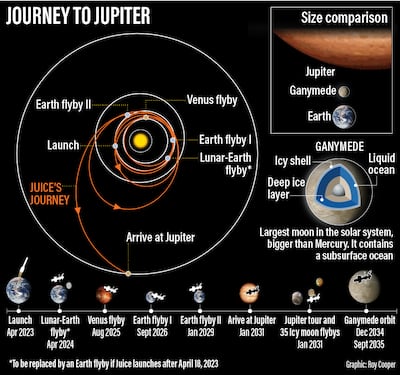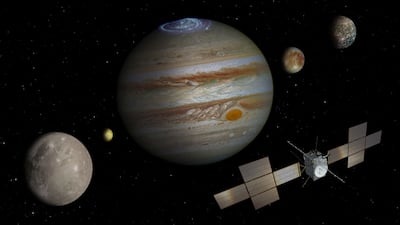A European space mission to Jupiter was postponed minutes before launch on Thursday due to a risk of lightning.
The unmanned Jupiter Icy Moons Explorer, known as Juice, is now scheduled to take off on Friday from the launchpad in French Guiana.
The spacecraft and its Ariane 5 rocket are "in stable and safe condition", launch company Arianespace said.
The mission failed a last-minute weather check at the spaceport in Kourou.
"We don’t take any risk when it comes to launching a satellite," said Arianespace spokesman Raphael Chevrier.
Guests including King Philippe of Belgium had gathered for the start of an eight-year journey to Jupiter, in one of Europe's biggest space missions yet.

The delay is "not what we hoped for, but this is part of the game," said European Space Agency chief Josef Aschbacher. "Hopefully tomorrow we have clearer skies".
The launch is now scheduled for 9.14am local time on Friday, or 2.14pm Central European Time.
Delays are fairly common for space launches, which have a small window in which orbits align in the optimal way. Juice could be set back by months if it cannot blast off in April.
The €1.6 billion ($1.76 billion) ESA mission is intended to find out whether Jupiter's icy moons of Europa, Ganymede and Callisto are habitable.
Juice is expected to reach the moons in 2031 after taking detours to Venus and Earth to pick up momentum and slingshot itself towards Jupiter.
In 2034, the probe will attempt to enter the orbit of Ganymede, a first for a moon other than our own.
The almost planet-sized Ganymede is of particular interest because it has an unusual magnetic field similar to Earth's. A separate Nasa mission due for launch in 2024 will focus on Europa.

Juice's main goal "is to understand whether there are habitable environments among the icy moons and around a giant planet like Jupiter", said Olivier Witasse, a scientist on the project.
"Jupiter is really a miniaturised solar system. To understand Jupiter better is the key to understanding our own solar system, how it was formed, how it evolved with time."
The spacecraft's 10 instruments will send back pictures and scientific data via a 2.4-metre antenna.
It is engraved with a tribute to Galileo Galilei, the scientist who in 1610 discovered Jupiter's foremost moons.
Nasa has contributed to Juice's hardware but the ESA-led mission is its first to Jupiter.
The National toured the factory in France where Juice was assembled before it was moved to French Guiana for launch.

An Ariane 5 rocket will carry it into space in what will be one of the last flights for an experienced line of launch vehicles.
The orbiter will be released from the rocket 27 minutes after take-off.
Recent launch failures, as well as the severing of ties with Russia because of the war in Ukraine, have left Europe struggling to secure independent access to space.
However, people involved with the project say the Ariane 5 is a trusted rocket and have played down any pre-launch nerves.
Flight directors say everything went to plan in rehearsals.
"We are not concerned with a new launcher, or an almost new launcher or a launcher that just had a problem," project manager Giuseppe Sarri said at the Toulouse factory in January.
The launch window was selected because the planets are aligned in a way that will allow Juice to conserve fuel.
It is carrying vast solar panels that will be activated an hour and 40 minutes after launch.
The eight-year meander means Juice will have to withstand the 250ºC heat of Venus and the minus 230ºC cold of Jupiter.


